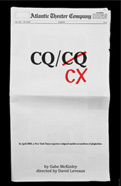Gabe McKinley on the Scandal That Shook The New York Times and Inspired His Play CQ/CX
About the author:
When aspiring actor Gabe McKinley took a job at The New York Times, where three of his siblings (including former theater reporter Jesse McKinley) had worked, he had no idea that from his perch in the newsroom he would witness a scandal that would rock the institution—and inspire him to write a play. In 2003, the paper of record found itself in the center of a scandal after evidence came out that up-and-coming African-American reporter Jayson Blair had plagiarized dozens of stories. Almost 10 years later, McKinley has transformed this front-page saga for the stage in Atlantic Theatre Company's world premiere production of CQ/CX, which opens February 15 at the Peter Norton Space, directed by five-time Tony nominee David Leveaux. Broadway.com asked this young, award-winning playwright to reflect back on his experience at The New York Times and how CQ/CX interprets the real life drama.
![]()
It was a job. A job to get me through acting school before my inevitable movie stardom. Despite having both my brothers write for the paper and my sister having worked there, I thought it was going to be a pit stop, something a little better than waiting tables. I started as a clerk at The New York Times when I was 18 years old and I left the newsroom for the last time 12 years later, in 2008. In the meantime, I learned to love newspapers and the people that produce them every day. In the newsroom, I was surrounded by, and worked with, brilliant men and women who devoted themselves completely to a single institution, and I found it thrilling. For me, it was not unlike the theater in that it was a labor of love. These people lived for their jobs. They lived for The New York Times.
It was a remarkable time to work at a newspaper, one that combined major news—Clinton's impeachment, 2000 election, 9/11, two wars, anthrax in the mail and a sniper loose in Washington DC, to name a few—with tremendous upheaval in the industry as whole, brought on by the rise of the internet. When, in the spring of 2003, the news came out that Jayson Blair, a young reporter at the paper, and someone I knew socially, had fabricated and plagiarized dozens of stories, it shook The New York Times to its core. To the people who devoted their lives to the paper, to ethical journalism, it was a betrayal of the highest order. It changed everything. The paper, once the unassailable voice of fact, was now suspect, its confidence shaken. Jobs were lost and careers ruined. Jayson's lies would change the way the paper operated from the top down and alter an institution—an entire profession—that had worked one way for over a hundred years.
At the time, I had no idea I would write a play about the scandal—hell, I didn't even know I was a playwright—but I knew it was one of the most dramatic experiences of my life. Years passed, and the scandal faded from most people's memories. I moved from being an unemployed actor to an unemployed playwright, but I never forgot those days at the paper. I had always thought there was a play in the scandal, but I wasn't quite able to figure out how to write it. A play about intellectual property theft is not something you see on stage very often. Watching people type generally makes for bad theater. Ultimately, I returned the character and to the passions of the people who work at the paper.
I did research for more than a year, and interviewed former workmates, approaching the play like, well, a journalist. Then I had to step away from the history of the scandal and write my play. Moving away from the facts to get to a greater truth. Some of the characters are based on actual people, while others are composites. I found no easy answers for Jayson's, motives, but rather many symptoms of a troubled young man. I was able to imbue my creation, Jay Bennett, with these symptoms while building the character. In fact, I embraced the challenge of reverse engineering the psyches of all actual people involved in the scandal. I found that I had to broaden the story, to give a comprehensive look at not only the scandal, but also the newspaper as a whole. What was the environment that allowed for a plagiarism scandal of this magnitude? What was the culture?
The paper was going through major changes at the time of Jayson's deception. Faced with declining revenue and the rise of online media, the publisher had brought in new leadership to push the paper into the digital age. There was a immense amount of pressure being put on younger and younger writers to produce, and produce big—Jayson being one of them. Finally, I wanted to take people inside the paper, to write the most realistic interpretation of a newsroom possible. The result is my play CQ/CX at the Atlantic Theater Company, directed by David Leveaux. Blessed with a remarkable cast and director, the production captures the newsroom that I grew up in. It is an honest work about dishonesty, and a singular look at a legendary American institution.
